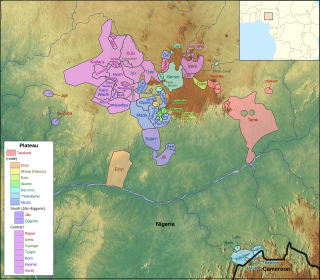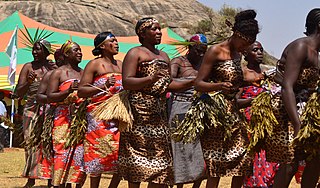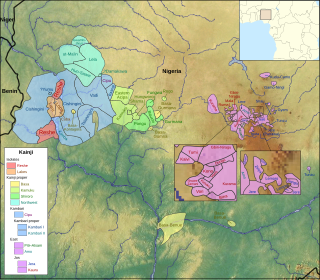Related Research Articles

Benue–Congo is a major branch of the Volta-Congo languages which covers most of Sub-Saharan Africa.

The forty or so Plateau languages are a tentative group of Benue–Congo languages spoken by 15 million people on the Jos Plateau, Southern Kaduna, Nasarawa State and in adjacent areas in central Nigeria.
Eggon, erroneously referred to as Mada - formerly a Plateau language spoken in central Nigeria. It is one of the major language in Nasarawa State.
Chakato is a West Chadic language spoken in Plateau State, Nigeria. It was identified by Roger Blench in 2016. It is spoken by about 500 people in one village, Dokan Tofa, which is located on the Jos-Shendam road in Plateau State. Blench (2017) suggests that Chakato may be related to spurious records of the Jorto language. Chakato speakers claim that their language is closely related to Goemai.

The Angas, Angas–Sura, or Central West Chadic languages are a branch of West Chadic languages spoken in Plateau State, north-central Nigeria.

Ron is an Afro-Asiatic language cluster spoken in Plateau State, Nigeria. Dialects include Bokkos, Daffo-Mbar-Butura, Monguna. Blench (2006) considers these to be separate languages.

The Kainji languages are a group of about 60 related languages spoken in west-central Nigeria. They form part of the Central Nigerian (Platoid) branch of Benue–Congo.
The five Tarokoid languages are a branch of the Plateau family spoken in central Nigeria, just north of the middle reaches of the Benue River. Tarok itself has 300,000 speakers, with Pe and Sur about 5,000 each. Yangkam is severely endangered, being spoken by around fifty elderly men.
The South Plateau languages, also known as Jilic–Eggonic, are spoken in central Nigeria. Eggon has 150,000 speakers and Jili perhaps 100,000.
The four Beromic languages are a branch of the Plateau languages spoken in central Nigeria by approximately 1 million people.
The four scattered and poorly attested Alumic languages form a branch of the Plateau languages of central Nigeria.

The Jukunoid languages are a branch of the Benue-Congo languages spoken by the Jukun and related peoples of Nigeria and Cameroon. They are distributed mostly throughout Taraba State, Nigeria and surrounding regions.
Yiwom (Ywom), also known as Gerka or Gerkawa by the Hausa, is a Chadic (Afro-Asiatic) language spoken in Plateau State, Nigeria.
Ahwai, also called the Ndunic languages, is a Plateau language cluster spoken to the southwest of Fadan Karshi in Sanga LGA, Kaduna State, Nigeria. Most villages are located at the foot of the Ahwai Mountains in Kaduna State.
Cara, also called Teriya after the village it is spoken in, is a small Plateau language of central Nigeria. Cara is spoken by about 3,000 people in Teriya village, Bassa, Plateau State, Nigeria.
The Rigwe language, Nkarigwe, is a Plateau language of Nigeria spoken by the Irigwe people mainly found in Bassa Local Government Area of Plateau State.
Pe, also spelled Pai, is a minor Plateau language of Nigeria. It has been classified in various branches of Plateau, but is now seen to be Tarokoid.
Horom (Rom) is a Plateau language of Nigeria.
Jibyal is a West Chadic language spoken in Plateau State, Nigeria. It was discovered by Roger Blench in 2017.
Miler is a West Chadic A3 language of Plateau State, Nigeria. It is spoken in two small enclaves that are completely surrounded by Miship-speaking villages. It was first documented by Roger Blench in 2022.
References
- ↑ Hasha at Ethnologue (18th ed., 2015) (subscription required)
- 1 2 Blench, Roger. 2012. The Hasha (Yashi) language of Central Nigeria and its affinities.
- ↑ Blench, Roger. M. 1999. Field trip to record the status of some little-known Nigerian languages. Ogmios, 11:11:14.
- Blench (2008) Prospecting proto-Plateau. Manuscript.